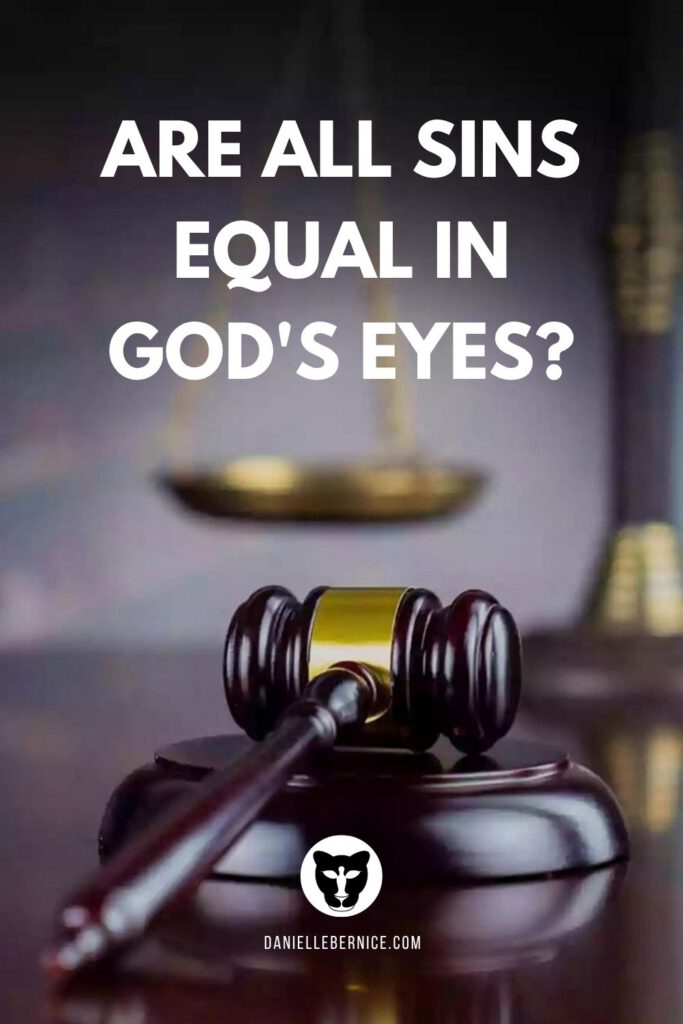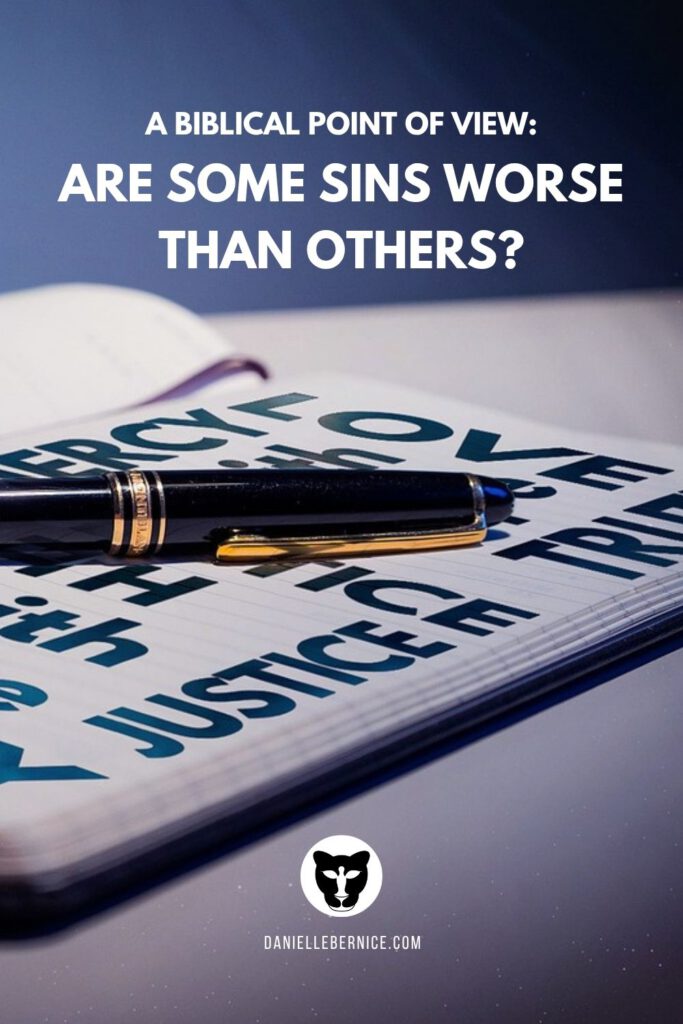Cora asks: “Is it true that sin is sin – no big sin or little sin?”
The question of whether all sins are equal or if there are degrees of sin came up often in conversations early in my walk with Christ. I understand why: the Bible has seemingly conflicting answers to this question, and many theologians disagree with each other on this topic. So, thank you, Cora, for asking this important question and giving me the opportunity to explore what the Bible has to say about sin and its consequences.
In many theological debates, people tend to choose sides. But I’ve learned that Scripture sometimes reveals truth in both positions, bringing unity rather than division to our understanding. The answer to this question is like that. Let me explain why.
What is sin?
Before we dive into the relevant Scripture passages, it’s important to define what we are talking about: what is sin exactly?
The short answer to that question would be: everything that opposes God.
When you know Who God is and what pleases Him, you will also understand what opposes God. For example, if you know from the Bible that God is Love, Light, Truth, and Life (1 John 4:8, 1:5, John 14:6), then you can draw a few conclusions:
- Sinning against God comes from an unloving attitude and entails doing or saying things that are unloving.
- Sinning against God means doing things we would rather do in darkness: shameful acts like stealing, abuse, or adultery that we hope no one will see.
- Sinning against God opposes Truth, which implies anything that involves slander, lies, false witnesses, etc.
- Sinning against God opposes Life, so all actions that lead to physical, mental, or spiritual death.
The more we know God, the deeper we understand what sin is. This is a process. Whenever we make a new friend, it takes time and effort to get to know them; this is also the case for getting to know God. Then, with the information we have and the help of the Holy Spirit, we can discern what is pleasing to God (Ephesians 5:10, 1 Thessalonians 4:1, Hebrews 13:20-21).
[Text continues after the image.]

How sin separates us from God
Sin begins when people stop focusing on pleasing God and start focusing on pleasing the flesh instead. Instead of trusting God’s Word, the focus shifts to what is worldly: what the flesh can see, feel, taste, and hear, and what it desires. In essence, we repeat what Eve did when she sinned: instead of listening to God, she listened to the voice of the serpent, saw that the tree was desirable, took its fruit, and tasted it (Genesis 3:6).
In doing so, we give Satan, the prince of this world, authority over our lives, just like Eve did. This leads to death for at least two reasons: Satan has been defeated and will be thrown into hell, along with those who follow him (Matthew 23:33, John 8:39-44). And it leads to spiritual death, because God is the One who gives life to our spirits. So, when we sin and die without repenting and asking for forgiveness, we face not only physical death but also spiritual and eternal death (Hebrews 12:17, Revelation 20:14-15).
When we die spiritually, we also lose our ability to communicate with God. We will feel that our prayers bounce off the ceiling, we won’t be able to understand Scripture, and we can’t see God’s hand in our lives.
Sin creates a chasm between God and the sinner. This chasm exists due to the difference between Him and us: we should be formed in the image of our Father, but instead, we are formed in the image of His enemy. While He is light, we walk in darkness; the darkness of sin blinds us, meaning we can no longer discern God’s will, His voice, and His blessings. Unless we do something against it, our faith becomes weaker and weaker, and we become darker and darker.
All or nothing
Light obliterates darkness. So, someone with a dark heart cannot stand in the presence of God and live. Whether that person -theoretically- has committed only one sin against God or many, without repentance and accepting Jesus as Lord and Savior, they deserve the death penalty according to God, and they end up in hell with their father the devil.
We have to adhere to the whole Law to be saved, which is impossible without the help of the Holy Spirit, as Bible history makes clear. That’s why, thanks to Jesus, we are saved by grace through faith (Ephesians 2:1-9). If we were to live by the Law to be saved and were to stumble at just one point, we would be guilty of breaking the whole Law and not be saved (Romans 6:23).
This can be difficult to understand. Let me explain it this way: Jesus is the Word made flesh (John 1:1-14). That means that the Law (a large part of the Word) is a large part of Him. As Christians, we have to live like Jesus, and therefore, if we deny, forsake, or diminish only one thing in the Law, we do precisely that to Jesus, and we can’t live like Him. As a consequence, He will deny, forsake, or diminish us unless we repent and turn back to Him. Not believing that the Law is good means that you don’t believe that that part of Jesus is good; it demonstrates a lack of faith and rebellion against God.
Thankfully, Jesus paid the price for our sins in full; He bought our freedom by dying for our sins on the cross. This means that we always have a choice: we can repent, ask for forgiveness, and walk by Jesus’ Spirit, so that we won’t sin again. When we choose Him as the Lord of our lives, we will be saved.
The Biblical evidence: Not all sins are equal
For us, it’s impossible to judge how grave our sin is. A seemingly innocent choice can impact generations. I mean, even though God warned Adam that eating from the tree would lead to death (Genesis 2:17), Eve didn’t believe that her sin would equate to suicide and murder. But her actions led to her own death, that of her husband, and of every generation that would follow. Even long after she committed that sin, she couldn’t have known that you and I would still suffer the consequences of her disobedience today. If she had trusted God’s words, she wouldn’t have taken the fruit, even without knowing the full extent of the consequences.
Sin always has consequences we cannot foresee or control. Every choice we make sends ripples through our relationships, our communities, and our own souls.
Only God, Who transcends time and space, can truly judge the true gravity of our sins and the effect of every good deed we do. He will judge us and repay us with justice when the time of our judgment arrives. Thankfully, God promises to forgive our sins when we repent and ask for forgiveness, if we also forgive others their sins against us.
God looks at the heart
Forgiving others is essential because God treats us according to the state of our hearts and will measure us with the measure we use (Matthew 7:1-2). If we judge, we will be judged; if we are unforgiving, we will not be forgiven either (Matthew 6:15). If we do wrong, we will be done wrong (2 Peter 2:13). If we deny God, He will deny us, and so on (Matthew 10:32-33).
Because of this, sins cannot be equal; otherwise, every sin would have one and the same punishment.
In some cases, an act could be perceived as sinful, while in God’s eyes, it isn’t. Take Rahab for example. She lied and deceived her authorities, but she did it out of reverence for God, and so God saved her and her house (Joshua 2:1-21).
So, how do we correctly judge if something is a sin? Because the Holy Spirit knows the mind of God, we can judge our actions with the Spirit’s help. This has been true even in the Old Testament, when judges, prophets, priests, and kings judged sin with God’s help.
But by the time Jesus walked the earth, most people were living by the flesh. In His sermon on the mount, He made clear that sin wasn’t judged strictly enough (Matthew 5:14-48). Sin always starts with a fleshly attitude; a heart and mind that is not focused on what is Spiritual, but on what is worldly. Because if we walk by the Spirit, we will automatically do what pleases God (Galatians 5:16-18).
[Text continues after the image.]

Scripture verses on degrees of sin
Multiple Scripture verses say that there is a difference in sin severity. For example:
- “All wrongdoing is sin, but there is sin that does not lead to death” (1 John 5:17).
- “Jesus answered him, ‘You would have no authority over me at all unless it had been given you from above. Therefore he who delivered me over to you has the greater sin’” (John 19:11, emphasis added).
- “And that servant who knew his master’s will but did not get ready or act according to his will, will receive a severe beating. But the one who did not know, and did what deserved a beating, will receive a light beating. Everyone to whom much was given, of him much will be required, and from him to whom they entrusted much, they will demand the more” (Luke 12:47-48).
- “Therefore I tell you, every sin and blasphemy will be forgiven people, but the blasphemy against the Spirit will not be forgiven” (Matthew 12:31).
These verses make clear that some sins are perceived by God as more severe than others, with blasphemy against the Holy Spirit being the worst. But also that the same sin can be judged as more severe when executed by one person than by another: if you know God’s will and sin anyway, this is perceived as worse than if you had no idea you were sinning. Therefore, the type of teaching I do comes with a huge responsibility: “Not many of you should become teachers, my brothers, for you know that we who teach will be judged with greater strictness,” it says in James 3:1.
Some actions please God more than others
Just like there are degrees of sin, I also believe that some actions are more pleasing to God than others. When we look at Martha and Mary in Luke 10, we can see that Martha served Jesus. Even though she focused on physical food rather than spiritual food, I don’t think that she committed a grave sin. (I say this with some caution, since I am not the Judge.)
She mistakenly believed that doing works was more important than sitting at Jesus’ feet like her sister Mary. And because she was toiling in the flesh, she was annoyed, troubled, anxious, and probably tired. Sitting at Jesus’ feet, on the other hand, leaves one peaceful and recharged. Jesus commended Mary for her choice, implying that Mary’s actions pleased Him more.
Now, if I were to make Martha’s choice today, knowing what I now know, it would be a more serious sin: I’ve written an entire book about burnout as a result of toiling in the flesh, so for me, toiling in the flesh would probably not just be ignorance; it would be rebellion against God’s will for my life.
My reasoning for some things being less or more pleasing to God comes from Scripture verses such as these:
- “Now if anyone builds on the foundation with gold, silver, precious stones, wood, hay, straw— each one’s work will become manifest, for the Day will disclose it, because it will be revealed by fire, and the fire will test what sort of work each one has done. If the work that anyone has built on the foundation survives, he will receive a reward. If anyone’s work is burned up, he will suffer loss, though he himself will be saved, but only as through fire” (1 Corinthians 3:12-15).
- “To do righteousness and justice is more acceptable to the Lord than sacrifice” (Proverbs 21:3).
- “Woe to you, scribes and Pharisees, hypocrites! For you tithe mint and dill and cumin, and have neglected the weightier matters of the law: justice and mercy and faithfulness. These you ought to have done, without neglecting the others” (Matthew 23:23).
What this means for all of us today
God is just and merciful; we can trust in that. As His children, this means that He corrects us and disciplines us, because He loves us and wants to spend time with us. He wants to be our good Father, Friend, Leader, and Teacher, so that we can have the best life we can possibly have: a life in which we bear fruit and are a blessing to others, becoming joyful, hopeful, loving, peaceful, and, overall, blessed. For that to happen, nothing should stand between us and Him.
So, if you have sinned, whether that was a big sin or a little sin, pray for forgiveness and change your ways. Or, if you have been feeling a distance between you and God for a while, ask the Holy Spirit to identify any sin that may stand between you and Him, and work on that with Him.
We must believe what the Bible says about us and about forgiveness. If Jesus is the Word, then not believing what’s in the Word means that you don’t believe that Jesus is the Truth. Make the choice to believe the Word, even when you don’t understand it. Don’t be like Eve; withstand the temptation, and continue in faithful obedience, day in and day out.
This also means that even when we don’t feel forgiven after asking for forgiveness, we must believe that we are, because the Bible says so: “If we confess our sins, he is faithful and just to forgive us our sins and to cleanse us from all unrighteousness” (1 John 1:9). Not believing this, and being less merciful to yourself than God is, is also sin!
Conclusion
To summarize it in one sentence: I believe that all sin against God separates us from Him, but that not all sin is equal in God’s eyes.
I hope this answers your question, Cora. May God bless you in your effort to increase your discernment!
You may also like: Renewal comes after Repentance

